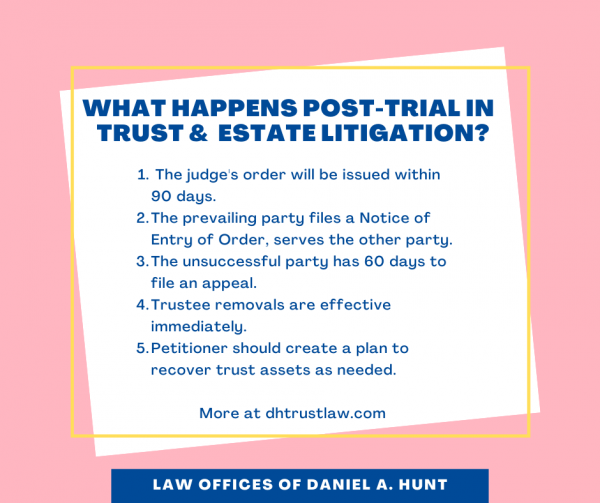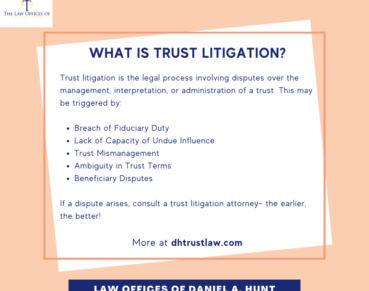What Happens Post-Trial in Trust & Estate Litigation?

What happens post-trial in trust and estate litigation? What happens next will depend on whether the judge sided with you or with the opposing party. If the judge sided with you, your attorney needs to file a Notice of Entry of Order and serve it on all parties. If the judge sided with the opposing party and you wish to appeal the decision, you need to understand the process and time frame for appeals.
Judge’s Post-Trial Decision
If the judge didn’t provide a verbal decision at the conclusion of your trust & estate litigation trial, they likely took the matter under submission. The procedure for communicating the judge’s decision varies somewhat from county to county. In general, within 90 days, the judge will post their ruling on the court record. This is usually available online in most counties. After an order of the court has been issued, a courtroom clerk will also mail a copy to all parties.
Filing a Notice of Entry of Order in Trust & Estate Litigation
If the judge sided with you in their decision, your party should file a Notice of Entry of Order and serve it upon all parties within 60 days. This document informs all parties of the court’s order or judgment and triggers important deadlines for post-ruling procedures, including filing an appeal.
When Will Changes Occur?
If the judge sided with the Petitioner, when will the changes they requested take place? This will depend on what changes they requested in their petition.
If the Petitioner requested that the trustee be removed and replaced, that will happen immediately, if granted. Collecting assets is usually more complicated, such as when a trustee or beneficiary stole trust assets that now must be returned to the trust. In order to do this, the Petitioner may need to:
- Seek for the trustee to turn over trust accounts to the new trustee or beneficiaries.
- Arrange for deeds to be drafted and recorded to transfer real property.
- Create a plan to collect money judgment against the personal assets of a trustee or beneficiary (for example, wage garnishments or seizing bank accounts).
Requirements to Appeal the Decision
What happens if the judge didn’t side with you? Can you appeal that decision? If the judge didn’t side with you in the trial, you may be able to appeal successfully if you meet two specific requirements:
- A court reporter was present for the whole hearing. This means there is a written record of the court proceedings that can be referenced. If there is no record to appeal from, then your appeal is likely doomed before it even gets started.
- There is an appealable issue. Appealable issues include an error in the stated law during the hearing, a procedural issue during the trial, or “overreaching” in the judge’s discretion. Note that the latter is the most difficult to prove.
Steps to Appeal the Decision
In order to appeal a judge’s decision post-trial, you should do the following things:
- Hire an attorney who handles appeals.
- File a Notice of Appeal within 60 days of the prevailing party filing a Notice of Entry of Order.
- Obtain a copy of the court records.
- Meet multiple deadlines to submit paperwork to the court and serve on the other party.
While it may be possible to appeal a judge’s decision post-trial if you meet the requirements, should you? Our professional experience has shown that appealing a judge’s decision after a trust & estate litigation trial is a difficult process, expensive, and carries a low probability of success.
If you have any questions about what happens post-trial in trust & estate litigation, feel free to contact our office.
Law Offices of Daniel A. Hunt
The Law Offices of Daniel A. Hunt is a California law firm specializing in Estate Planning; Trust Administration & Litigation; Probate; and Conservatorships. We've helped over 10,000 clients find peace of mind. We serve clients throughout the greater Sacramento region and the state of California.




